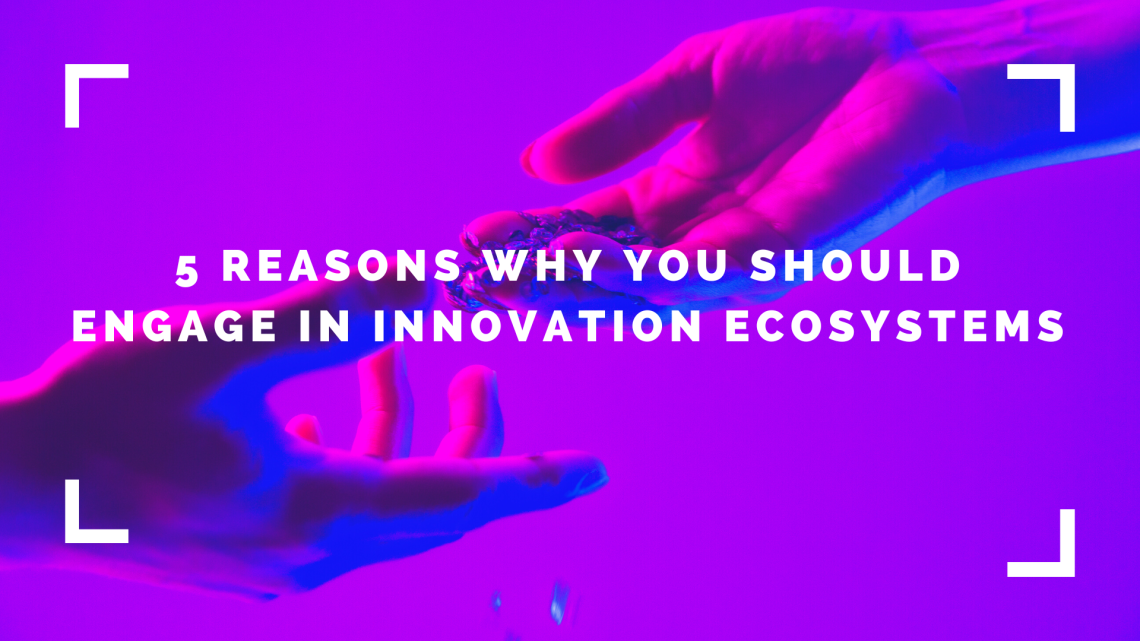
The concept of open innovation has become widely recognized since Dr. Chesrough coined the term in 2003 with the publication of his book by the same name. In the meantime, innovation ecosystems have become a critical aspect of the business landscape. The term itself goes back to Moore's publications about the business ecosystem in 1993.
Today, in the midst of a historical poly-crisis, the world is changing at an unprecedented pace, heavily disrupting how people interact, live, work, produce, and shop. Therefore, it is crucial for everyone to be aware of the importance of open innovation and innovation ecosystems, including businesses, governments, universities, entrepreneurs, and individuals.
So, What is an Innovation Ecosystem?
According to Granstrand and Holgersson (2020), an innovation ecosystem is ‘the evolving set of actors, activities, and artifacts, and the institutions and relations, including complementary and substitute relations, that are important for the innovative performance of an actor or a population of actors.’
In simpler terms, an innovation ecosystem refers to the interconnected network of individuals, organizations, and institutions that collaborate to create, develop, and bring new products and services to the market. It is like a regional and very focused hotspot for open innovation with highly engaged stakeholders. These ecosystems typically comprise stakeholders such as corporations, entrepreneurs, investors, universities, research institutions, and government agencies, all working together to create an environment that fosters innovation, creativity, and growth.
The Power of Innovation Ecosystems
The importance of innovation ecosystems cannot be overstated, especially in an increasingly digitized BANI world. They offer numerous benefits to businesses and individuals, including:
Collaboration: Innovation ecosystems foster collaboration among businesses, government agencies, research institutions, and other stakeholders. This collaboration creates opportunities for sharing ideas, knowledge, and resources, leading to the creation of new products and services.
Access to Funding: Startups and entrepreneurs often struggle to secure funding to develop and bring their products to market. Innovation ecosystems provide access to funding through angel investors, venture capitalists, and other funding sources. This access to funding often proves to be crucial for startups to scale fast.
Access to Talent: Innovation ecosystems attract and retain top talent, including scientists, engineers, and other skilled professionals. This talent pool is essential for the creation and development of innovative products and services.
Access to Markets: Partnerships, collaborations, and other forms of networking provide access to new markets. This access to markets is essential for businesses seeking to grow and expand their operations.
Economic Growth: By creating jobs, attracting investment, and driving innovation, innovation ecosystems stimulate economic growth, benefiting individuals, businesses, and communities by creating both wealth and prosperity.
If we look at best practices, innovation ecosystems have often been critical in driving digital transformation and creating value. For instance, the financial services sector has undergone significant changes in recent years, driven by the emergence of fintech startups. These startups have disrupted traditional banking and financial services by providing innovative solutions that are faster, more efficient, and more convenient for customers. This disruption has been possible due to innovation hubs, like Plug and Play or Findec, that have fostered collaboration, access to funding, talent, and markets.
Similarly, innovation ecosystems play (and have played) a crucial role in the development of artificial intelligence (AI) and machine learning (ML) technologies. These technologies have transformed how businesses operate, from automating routine tasks to creating personalized customer experiences. Multi-stakeholder innovation hubs foster the development and go-to-market of AI and ML technologies as well as the creation of new business models and opportunities. In Germany, KI Park has established itself as one of the leading forces to accelerate AI innovations 'made in Germany and Europe' (KI Park 2023).
Considering sustainability and urgent global challenges such as climate change, innovation ecosystems have become crucial in finding groundbreaking and sustainable solutions. The development of clean energy technologies, sustainable agriculture, and circular economy models are often the prominent results of geographically bounded open innovation efforts. These solutions are critical to creating a more sustainable and liveable future for all.
In conclusion, ecosystem-based strategies equip leaders with the tools, resources, and support they need to stay ahead of the curve, meet the demands of various stakeholders, and remain competitive. They are essential in our increasingly complex world and often provide value and benefits to all involved stakeholders. Collaboration, access to funding, talent, markets, and economic growth are some of the key benefits that innovation ecosystems offer, and everyone should be aware of their importance in driving innovation and creating a more prosperous future.
Sources:
Chesbrough, H. W. (2003). Open Innovation: The New Imperative for Creating and Profiting from Technology, Harvard Business Press.
Findec (2023). Sweden’s Fintech Hub. Access online: https://findec.co
Granstrand, O. & Holgersson, M. (2020). Innovation ecosystems: A conceptual review and a new definition, Technovation, Volumes 90–91, February–March 2020. Available online: https://www.sciencedirect.com/science/article/pii/S0166497218303870
KI Park (2023). Who we are. Access Online: https://kipark.de/en
Moore (1993). Predators and Prey: A New Ecology of Competition, Harvard Business Review. Available online: https://hbr.org/1993/05/predators-and-prey-a-new-ecology-of-competition
Plug and Play (2023). Fintech - Rethinking innovation in financial services. Access Online: https://www.plugandplaytechcenter.com/fintech





